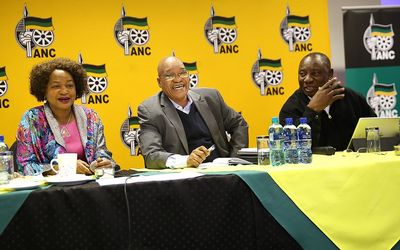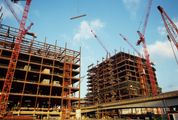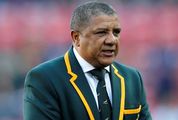HOW does the ANC and the government respond to the drubbing it received in the local government elections? Judging by events on Thursday, the omens are not good. Most of the ANC delegation walked out of the opening speech of the new executive mayor of Nelson Mandela Bay, Athol Trollip. The event must have brought home to the ANC, which has run the city for 22 years, what it has lost. And there is more to come.
The formal response of the ANC was disappointing. ANC secretary-general Gwede Mantashe emerged from a full four days of talks at the most senior level saying, "it can’t be business as usual".
But much of what he specified was, in fact, precisely that. The ANC would take "collective responsibility" for the decline in support, which is really code for not blaming the result on the declining popularity and crucial miss-steps of President Jacob Zuma.
Yet, Mantashe did make one important statement.
"To effectively deal with the triple challenge of unemployment, poverty, and inequality, government ... must reprioritise the budget" to ensure National Development Plan (NDP) programmes are funded, he said.
This too is coded language. It reflects a sense among senior ANC cadres that the real reason the ANC is losing support is the fact that the Treasury is paring back spending. Objectively, this is correct.
According to the 2016 Budget Review, the average nominal growth rate in spending on postschool education, for example, grew 11% per year from 2013 to 2016. That has been pared back to 7.9% for the 2016 to 2019 period.
The housing budget has been cut by similar levels. Support for big infrastructure efforts, mainly by the parastatals, has been cut back savagely. In the past three years, it increased 10.4% a year; now it will rise a measly 3.5%.
The reason for the cutbacks are obvious: the Treasury has ratings agencies breathing down its neck, and the threat of SA’s debt being reduced to junk status hangs over government finances. SA’s debt will rise to almost R2-trillion by the end of the current fiscal year. Debt has risen by 10 percentage points to 50.5% of gross domestic product in just three years.
With increases to the national debt really difficult, what can the government do? One possibility is to do as Mantashe suggests: reprioritise. But in that case, what gets cut, and what gets more money?
In fact, the opportunities are not as abundant as they might seem. The budget is already focused on social services, and practically all new money coming in is being concentrated in this area. Expenditure on social services is set to grow by a percentage point more than the average. Could that be increased? Possibly, but where would the money come from?
The most obvious candidates for reduction are infrastructure expenditure, the public servant salary bill, and social pensions — and each of these has consequences. Reductions to the increases in public servant salaries will obviously be unpopular in a core support constituency for the ANC. Social pensions are a huge expense, and the argument in favour of keeping increases under tight control would be to try to tackle youth issues to a greater extent than is happening at the moment.
Increasing infrastructure expenditure is core to the NDP because it should improve the ease of doing business, which ought to improve economic growth. Yet, despite the huge amounts SA has spent on infrastructure, growth has remained disappointing.
The problem with "reprioritising" is that it assumes the decline in the ANC’s support is a spending issue. But it is not. The core issue is confidence. The ANC needs to imbue the country with a sense of direction and assurance. And that raises precisely the issue the ANC seems determined not to discuss: leadership.

President Jacob Zuma (centre) and Cyril Ramaphosa with with Baleka Mbete attend an ANC leadership meeting in Irene. Picture: ALON SKUY/THE TIMES
HOW does the ANC and the government respond to the drubbing it received in the local government elections? Judging by events on Thursday, the omens are not good. Most of the ANC delegation walked out of the opening speech of the new executive mayor of Nelson Mandela Bay, Athol Trollip. The event must have brought home to the ANC, which has run the city for 22 years, what it has lost. And there is more to come.
The formal response of the ANC was disappointing. ANC secretary-general Gwede Mantashe emerged from a full four days of talks at the most senior level saying, "it can’t be business as usual".
But much of what he specified was, in fact, precisely that. The ANC would take "collective responsibility" for the decline in support, which is really code for not blaming the result on the declining popularity and crucial miss-steps of President Jacob Zuma.
Yet, Mantashe did make one important statement.
"To effectively deal with the triple challenge of unemployment, poverty, and inequality, government ... must reprioritise the budget" to ensure National Development Plan (NDP) programmes are funded, he said.
This too is coded language. It reflects a sense among senior ANC cadres that the real reason the ANC is losing support is the fact that the Treasury is paring back spending. Objectively, this is correct.
According to the 2016 Budget Review, the average nominal growth rate in spending on postschool education, for example, grew 11% per year from 2013 to 2016. That has been pared back to 7.9% for the 2016 to 2019 period.
The housing budget has been cut by similar levels. Support for big infrastructure efforts, mainly by the parastatals, has been cut back savagely. In the past three years, it increased 10.4% a year; now it will rise a measly 3.5%.
The reason for the cutbacks are obvious: the Treasury has ratings agencies breathing down its neck, and the threat of SA’s debt being reduced to junk status hangs over government finances. SA’s debt will rise to almost R2-trillion by the end of the current fiscal year. Debt has risen by 10 percentage points to 50.5% of gross domestic product in just three years.
With increases to the national debt really difficult, what can the government do? One possibility is to do as Mantashe suggests: reprioritise. But in that case, what gets cut, and what gets more money?
In fact, the opportunities are not as abundant as they might seem. The budget is already focused on social services, and practically all new money coming in is being concentrated in this area. Expenditure on social services is set to grow by a percentage point more than the average. Could that be increased? Possibly, but where would the money come from?
The most obvious candidates for reduction are infrastructure expenditure, the public servant salary bill, and social pensions — and each of these has consequences. Reductions to the increases in public servant salaries will obviously be unpopular in a core support constituency for the ANC. Social pensions are a huge expense, and the argument in favour of keeping increases under tight control would be to try to tackle youth issues to a greater extent than is happening at the moment.
Increasing infrastructure expenditure is core to the NDP because it should improve the ease of doing business, which ought to improve economic growth. Yet, despite the huge amounts SA has spent on infrastructure, growth has remained disappointing.
The problem with "reprioritising" is that it assumes the decline in the ANC’s support is a spending issue. But it is not. The core issue is confidence. The ANC needs to imbue the country with a sense of direction and assurance. And that raises precisely the issue the ANC seems determined not to discuss: leadership.






















